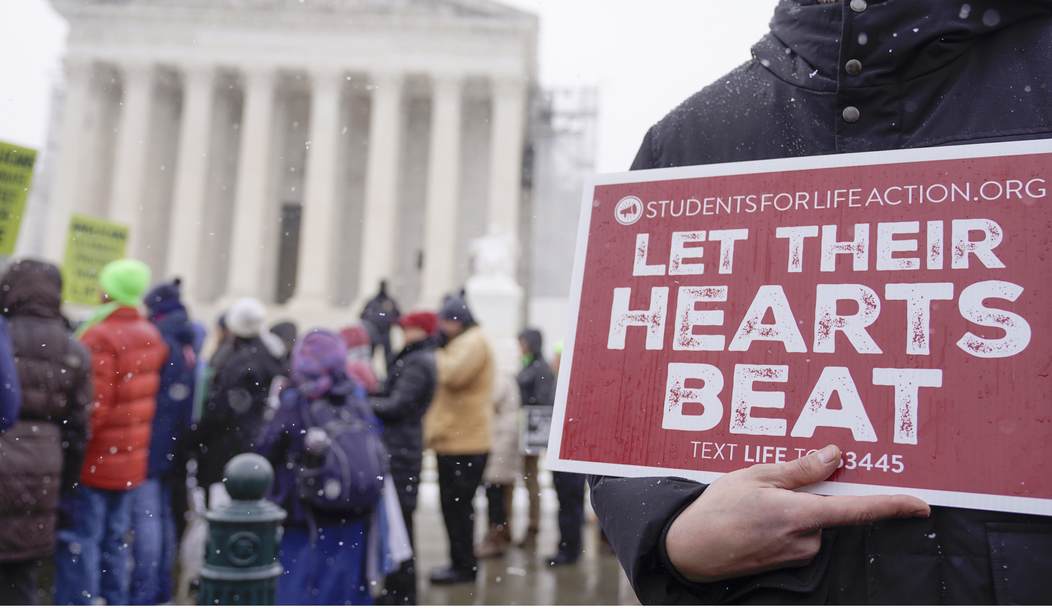The Supreme Court recently heard oral arguments in Idaho/Moyle v. United States regarding Biden’s Emergency Medical Treatment and Labor Act (EMTALA) guidance, a transparent attempt to use existing federal laws to force physicians to perform abortions, especially in states with pro-life protections. As a board-certified obstetrician, I have practiced under EMTALA for over 30 years, and it has never been confusing to me or to any of my peers. We know the purpose of the law is to protect the health of mothers and their unborn children, and that is every obstetrician’s mission, as well.
The Biden administration has disregarded EMTALA’s plain text, which intends to prevent “patient dumping” and requires evaluation, stabilization, and (if necessary) transfer to another medical facility when an “emergency medical condition” places the health of the woman or her unborn child in serious jeopardy.
The administration’s guidance never mentions the unborn child, implying the child’s needs are not a priority. It requires a provider to perform an abortion “if it is the stabilizing treatment necessary to resolve the medical emergency,” even though EMTALA does not specify the treatment or stabilization physicians must administer but allows them to use their medical judgment to determine the best course of action. The Charlotte Lozier Institute argued these and other points that undermine the administration’s case with great detail in their amicus brief filed in support of the state of Idaho.
If a pregnancy complication poses a risk to a mother’s life, every state in the country allows the physician to intervene. These laws allow physicians to use their “reasonable” or “good faith” medical judgment to determine when to intervene in an emergency. There is no requirement that a threat be immediate, only foreseeable.
Physicians spend years developing that judgment in school and practice. While we can’t always predict the risk’s severity, we do know which complications can threaten a woman’s life and when to intervene. We don’t wait until a woman is dying but discuss treatment options with a woman and her family when the diagnosis is made, so that we can prevent her from becoming seriously ill.
Recommended
This is why I was frustrated by some of the conversations between the solicitor general and some of the left-leaning justices when they discussed complex medical scenarios as overly simplified hypotheticals, assuming that physicians can predict with certainty whether a complication would kill a woman or “merely” cause serious damage to an organ system, implying that Idaho law allows intervention in one scenario but not in the other. Based on their clinical experience and their knowledge of the peer-reviewed literature, physicians have the skills to make judgment calls, and no law is preventing them from doing so. Hospitals usually have protocols to assist physicians in their decision making and to support them in their actions.
We’ve seen news articles highlight women injured in pregnancy emergencies because physicians were afraid to intervene following the Dobbs decision. These actions are not the fault of the laws, which clearly allow intervention. Abortion advocates (including the leadership of some medical organizations) have sown confusion and fear to turn Americans against pro-life laws and expand abortion. These cynical tactics unfortunately have impacted how some physicians practice medicine. This can be remedied by calling on medical organizations to provide more guidance, but some ideologically driven medical organizations have refused to offer it.
Like approximately 90% of obstetricians, I do not perform elective abortions, and most hospital systems do not provide them. Yet I have always felt empowered to intervene if a pregnancy emergency threatened my patient’s life, and I have seen my peers do the same, usually by inducing labor or, in rare circumstances, through cesarean section delivery.
Even in life-threatening situations, abortion is rarely, if ever, necessary. I’ve delivered over 5,000 babies and I have never had to perform an abortion, even though there have been times I have needed to deliver a child to protect his or her mother. Regrettably, the child does not always survive.
I have found the caring approach of perinatal palliative care – a multi-disciplinary, coordinated care strategy, focused on relieving suffering and honoring the life of the unfortunate child – to be preferred in this situation. I’ve never had a mother express a preference for a D&E abortion over induction. When the tragic loss of a desired baby occurs, the mother wants the baby’s body treated with respect and usually will want the chance to say “goodbye,” to hold the child, and bury him or her. This supportive care assists the family in their grief.
The administration’s blatant attempt to highjack a law to promote a pro-abortion agenda should be recognized for the ideological maneuver it is. The Supreme Court should recognize and rebut this cynical misuse of power, and reaffirm the fact that Idaho has the right to protect the lives of all its citizens, including the unborn.























Join the conversation as a VIP Member